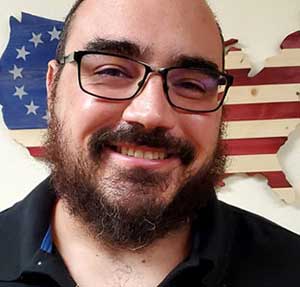Opinion by Anthony Garcia, President of Save the Second

USA – -(AmmoLand.com)- I am sure by now most of you have read Rob Pincu’s article. And if you haven’t read his co-authored article with Dan Gross and only the commentary about it then I would highly suggest you go read it and listen to his videos about it. Nearly all the attention that has been focused on the article has revolved around his discussion of background checks.
That is not what I am going to talk about, however.
What this article has done is laid bare the state of the Second Amendment community. And this has shown us that there is a demonstrable lack of unity, far too much knee-jerk reactionism, and little to no focus placed on messaging and narrative. A portion of Rob’s article was related to those last two topics, narrative and messaging, yet no attention has been paid to them. Ironically, controlling the narrative is one of the few ways that we will win and something that everyone can play a part in. Let’s discuss these topics one at a time, beginning with unity.
Unity
Gun control extremists and proponents of citizen disarmament have shown us for decades why it is important to maintain a united front. They have maintained an appearance of unity through thick and thin, regardless of nearly any scandal that comes out against one of their own, and they have plenty of legislative and cultural victories to show for it.
We must stay on point with our messaging and not allow ourselves to be distracted by internal politics. They do not allow internal politics to play a role in their outward appearance, and neither should we. In the gun-control camp, there are people that range the spectrum – from those who only support additional universal background checks to those who want to confiscate every gun in the United States. Regardless of their personal individual beliefs on the topic, they all remain united on one goal: gun control.
We must do the same; we must remain united and focused on the goal of expanding the legal framework of firearms rights regardless of internal policy disputes.
Your next objection is now probably something along the lines of, “it’s not wrong if the person in question actually does support gun control!” Well as I’ve stated the political spectrum for any individual ideological belief is vast and is certainly very nuanced. You also may have objective standards by which you judge another individual’s “purity,” but purity tests have long been the downfall of many a political movement – especially one which needs as many supporters as possible.

I proffer to you a simple litmus test to determine if someone falls in the camp of gun supporter, or gun controller.
Question one: Does that person rely on the firearms industry in some way to make their living? For example are they a firearm store owner, an instructor, a reviewer, etc?
If the answer to that question is yes then you have a firearms supporter, as logically an individual engaged in one of these professions is supporting firearms through their actions. I suppose it’s theoretically possible to have someone who disdains firearms engaged in one of these professions, however, their actions would still be supporting the firearms cause since actions speak far louder than words and thoughts.
If the answer is no then move to question two.
Question two: Are the majority of this person’s actions aligned with supporting firearms ownership and rights?
If the answer is yes, then once again you have someone who falls on the gun supporter spectrum. This question may sound very subjective, but it’s relatively easy to conclude. For example, despite the fact he claims to support firearms ownership Biden is clearly not a supporter of firearms as the only actions he has taken have been to restrict the ownership of firearms. When you look at the totality of an individual’s actions on a particular topic their beliefs become visible, as well as their level of conviction. With that in mind, the question should be easy to answer with enough information.
As previously discussed the spectrum of any political belief can be very wide, and it’s certainly okay to take disagreement with someone’s individual policy points. I’ll give you a controversial example: perhaps someone supports full ownership of everything currently covered under the NFA as well as modern sporting rifles and standard capacity magazines, however, they want to see the latter two moved under the NFA as well. This would result in a garden variety AR and its magazines being covered under the NFA.
They clearly fall under the “gun supporter” spectrum since they support ownership of all firearms, however, you may disagree with this policy point.
As long as they fall inside the spectrum of gun supporters however these disagreements should be conducted with reasonable discourse and not an embracement of cancel culture. Cancel culture is not an acceptable means to deal with people in our political spectrum that we may have disagreements with. This is how we remain unified – by not giving in to our desire for instant gratification and screaming for the transgressor to be escorted from the community. We are better than that, and together we are stronger.
Together we have more talent, more manpower, and a bigger voice. That is far more important than small policy disputes.
Reactionism

Knee-jerk reactions plague the Second Amendment community, both inside and out. These reactions range from the ridiculous and demonstrably false, to the same tired rhetoric repeated endlessly. I’m sure everyone reading this knows what I’m talking about. Unsupported conspiracy theories, ad hominems, scathing hit piece articles, and one-liners (“Shall not be infringed!”) dominate this particular arena.
Here’s the problem with the reactionism we see in the community directed at anything deemed untoward: it has a hidden irony of being counterproductive.
Think about it like this. When you are accosted in some manner over your support of firearms how do you react? If you are for instance at a public pro-gun rally and an overzealous gun control advocate gets in your face and screams, “why do you care more about guns than children?!” does that bring you around to their way of thinking? Or does it simply upset you and cause you to yell back? Similarly yelling “Shall not be infringed, you expletive!” at a gun control advocate will not cause them to come around to our way of thinking. It might make you feel better, but it will only harden their view against you and continue to degrade the image of our community as seen by others.
This counterproductive reactionism comes solely from a place of emotion, either anger or fear or sometimes both. Fear and anger are the strongest emotions, that’s why unethical organizations and individuals often use them in extremes to solicit money from people in our community. Don’t we want to come from a place of reason instead? Furthermore we, as gun rights advocates, frequently deride the opposition for the exact characteristics of being emotionally driven and having knee-jerk reactions – why would we as gun rights supporters knowingly participate in the same and thus position ourselves as hypocrites?
Rather than the same old rhetoric, I believe we should try a new approach that doesn’t have logical and emotional inconsistencies. We should adjust our speech to persuade others, not to attempt to force our beliefs on them. We should debate with people, not react with anger. We should talk to those we disagree with about their policy choices and ask them simply, “why?” That produces a conversation and a conversation is what is needed.
Messaging
Changing our messaging is not only a good idea, it’s going to be necessary if we ever want to expand the legal framework of firearms rights. We have a perfect opportunity to do it right now, and more than that it is necessary to act immediately. Support for stricter gun control has been rising very steadily for the past ten years, while gun ownership (as a percentage of households) has remained stagnant (Source: news.gallup.com/poll/1645/guns.aspx). What this means is that through their careful manipulation and control of messaging and narrative those who seek to disarm citizens have been winning minds to their side in no small amount. If you have a careful look through the polls however you’ll see that we still have remarkable support in certain areas and a window in which we can retake those in the center.
For a long time now the gun control extremists in the mainstream media and no small number of talking heads have been clearly focusing on a few messages. They are emotionally based first (which as discussed before has the biggest impact), followed by duplicitous statistics designed to fool anyone who doesn’t do the research themselves. They stay united and on point with this messaging. Above all, they claim that they want to save lives. Through careful repetition of this messaging, they have cultivated a very large following of people from all over the spectrum, a great number of which simply like the idea of saving lives. Make no mistake: some of these people are true sophists simply trying to take every gun in the country, and others are in it for more noble reasons but are misguided.
This is an important distinction, and I believe Dan Gross is a fantastic example of the latter – noble but perhaps misguided in his actions.
This comes back to a point from Rob’s article where he talked about finding common ground in the desire to save lives. Even the phrasing itself, “a desire to save lives,” has become so conflated in our culture with gun control that most gun rights supporters will cringe a little bit (I do anyway) because they know that anyone who says it will just want to infringe on my rights.
This is a big victory for gun control advocates. They have taken a phrase that should not be controversial at all and they have weaponized it. As a gun owner, there is nothing wrong with saying I want to save lives. There is nothing wrong with saying I want to find a way to reduce accidents. There is nothing wrong with saying I want to help reduce suicides.
So why do these phrases often invoke a visceral reaction from gun rights supporters? Why are they often met with fear, anger, and skepticism?
If you’ve been paying attention then you’ll know that the answer to that question is messaging. And in order to fight fire with fire, we must change our own messaging. We must communicate on common grounds with those who are noble but misguided. Contrary to popular belief, and I agree again here with Mr Pinucs, the majority of gun control supporters are not the extremist variety. They will listen to a well-reasoned argument. Even if the person you are talking to directly does not change their mind keep in mind that debates are often much more for the benefit of the viewer rather than the debater.
A well-reasoned argument along the lines of these common grounds could go something as follows:
“I want to save lives as well, let’s talk about the defensive uses of firearms versus the real statistics of violence perpetrated with firearms.”
A reasonable person will read the statistics and a seed will be planted in their mind that perhaps there is something to what you are saying. The extremists will never agree, but the debate was not for them in the first place. By communicating along common grounds we can stagnate and potentially reverse the rising trend of gun control support. This is something that can be done by everybody reading, you don’t have to have a public platform or a TV show. You can do this in every interaction you have online or in person.
Far more people than you may think will be responsive to this sort of reasoning. The most extreme beliefs of any ideology are usually the smallest number. That goes for me as well. I believe the right to self-defense is a natural right that every human being has. I don’t believe that it can be taken away by anyone, for any reason that society cares to construct. And I believe the right to self-defense encompasses the ownership of weaponry and accessories, as well as training, such as to allow you to be on equal footing with anyone who would attempt to harm you and available to anyone who could purchase such items in a free market economy.
Having these beliefs I know puts me at the thin end of the bell curve that any political ideology rests upon. I am what the gun control crowd would refer to as a gun rights extremist. That doesn’t bother me. But I understand that when compared to society at large I am most decidedly in a small minority. Most people will fall somewhere else in the spectrum, clustering mostly around the middle as in any bell curve. The other side understands this as well and this is why they frame their messaging the way that they do – to capture as much in the net as possible.
If we can communicate with people on the other side on that common ground then we can sway minds and if we can sway minds we can start to change the narrative. And changing the narrative is the most fundamental aspect that we should be focusing on as gun rights advocates.
Narrative
What is a narrative in this context? The one that’s being pushed against us is simple:
“Common sense gun control saves lives, and anyone who stands against saving lives is bad.”
While there’s perhaps some more nuance to it than that I believe that’s the main thrust. Wouldn’t a better narrative be “Having educated and armed individuals saves lives, and anyone who stands against saving lives is bad?” The narrative constructs itself through repeated usage of precisely selected messages, and right now the gun grabbers have all the power in constructing it.
How do we change the narrative? That starts with every action that we undertake in with regards to the pro-gun community. It starts with unity so that we can present a stronger base from which to attack the enemy. It continues with dismantling the reactionism that plagues us so that reason and evidence can reign supreme. Then we can change our messaging and debate with the enemy in order to sway and convince those who are in the middle to our side. And finally, when this is completed the narrative will begin to write itself as a product of a strong, cohesive community focused on saving lives through expansive firearms ownership and comprehensive education.
Conclusion
Once the whole narrative is changed in this fashion and it starts to be repeated more often by more people then, and only then, will we see the more fundamental expansion of firearms laws in a legal context inside of state and federal legislatures. This is how we fix the infringements already in place. This is how we expand going forward. We work together. We rewrite the narrative.
Anthony bought his first gun days after turning 18, and his first NRA membership shortly after that. A California native, he luckily escaped in 2010 to Colorado.
After finding some legs in local gun rights activism he was appalled to find the legislative overreach in 2013 with the passing of numerous unconstitutional gun control bills in CO.
He joined with others and formed the Basic Freedom Defense Fund, serving as the Treasurer and a founding board member, of the 501c(4) that would remove former state senator John Morse in a recall in Colorado in 2013. The recall was a national first in that it was run on a platform of gun rights. He worked directly alongside former NRA board member Timothy Knight in this endeavor.
Following that he continued a path in the oilfield, the trucking industry, and finally became a stock trader, all the while supporting gun rights locally in various capacities. Today he is a husband, father, NRA lifetime endowment member, staunch advocate of gun rights, and President of Save the Second – an organization currently dedicated to fixing the NRA with the help of other members.

